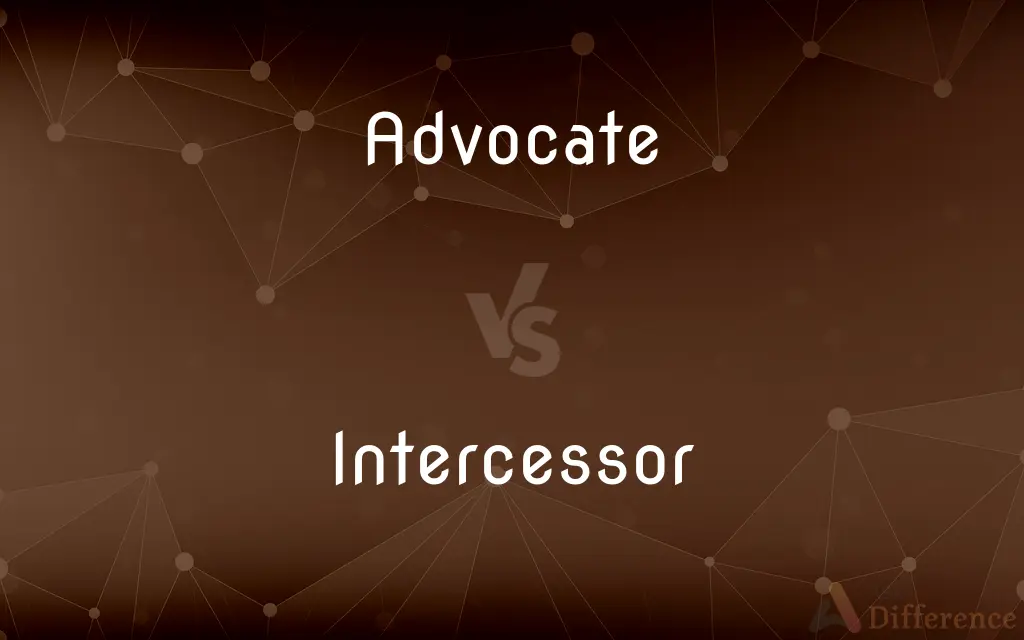Advocate vs. Intercessor — What's the Difference?
By Fiza Rafique & Urooj Arif — Updated on April 6, 2024
An advocate actively supports or argues for a cause or policy, focusing on public or legal representation, while an intercessor mediates or prays on behalf of others, often in a religious or spiritual context.

Difference Between Advocate and Intercessor
Table of Contents
ADVERTISEMENT
Key Differences
An advocate is someone who publicly supports or recommends a particular cause or policy. This role is commonly associated with legal professions, where advocates (similar to lawyers) represent clients in court, arguing on their behalf. In contrast, an intercessor acts as a mediator on a spiritual or interpersonal level, often praying or requesting assistance on behalf of others. The concept of intercession is deeply rooted in religious practices, where individuals pray for the needs of others, seeking divine intervention or support.
Advocacy isn't limited to the legal field; it extends to any scenario where someone champions a cause, such as environmental advocacy, human rights, or healthcare reform. The key aspect of being an advocate involves actively campaigning for change, supporting individuals or groups, and using one’s voice or platform to effect societal or personal advancements. Intercessors may operate within a church, community, or personal capacity, focusing on spiritual welfare rather than public or legal advocacy. Their role is characterized by a private or communal appeal to a higher power, emphasizing spiritual support and guidance over public campaigning.
While an advocate might work to change laws, policies, or public opinions through active lobbying and campaigning, an intercessor works through prayer, mediation, or spiritual practices aiming for personal or communal well-being. Advocates are often seen and heard, engaging in public debates, writing op-eds, or participating in protests. In contrast, intercessors may work behind the scenes, engaging in personal or group prayers, often within the context of their faith community.
The impact of advocacy is usually measured through changes in legislation, public policy, or social attitudes. Meanwhile, the impact of intercession is more personal or spiritual, potentially leading to changes in individuals’ lives, comfort during difficult times, or shifts in community dynamics. Advocates may use evidence, legal arguments, or persuasive speeches, whereas intercessors rely on faith, spiritual conviction, and the power of prayer or meditation.
Understanding the difference between these roles highlights the diverse ways individuals can support others—either through public advocacy and representation in various arenas or through spiritual support and prayerful mediation. Both advocates and intercessors play crucial roles in society, addressing different needs and operating in distinct realms of influence.
ADVERTISEMENT
Comparison Chart
Definition
Someone who publicly supports a cause or policy
Someone who prays or mediates on behalf of others
Primary Context
Legal, public policy, social causes
Religious, spiritual
Key Activities
Arguing, lobbying, campaigning
Praying, mediating, seeking divine intervention
Focus
Public representation, societal change
Spiritual welfare, personal support
Visibility
Public, often in the forefront
Private or within faith communities
Impact Measure
Legislation, policy change, societal attitudes
Personal or spiritual well-being, communal harmony
Tools/Methods
Evidence, legal arguments, public engagement
Faith, prayer, spiritual practices
Compare with Definitions
Advocate
Legal representative.
As an advocate, she represents clients in court to ensure their rights are protected.
Intercessor
Spiritual mediator.
As an intercessor, she spends hours in prayer for the healing of the sick in her community.
Advocate
Champion of causes.
He is an advocate for climate change, working tirelessly to promote environmental protection.
Intercessor
Religious advocate.
Intercessors may ask for divine intervention in times of crisis, believing in the power of prayer.
Advocate
Supporter of policy change.
Advocates for healthcare reform lobby for policies that ensure universal access to medical services.
Intercessor
Facilitator of spiritual support.
Intercessors organize prayer groups to support those going through tough times.
Advocate
Voice for the voiceless.
Advocates in the human rights field work to bring attention to those without a platform.
Intercessor
Support through prayer.
He acts as an intercessor, praying for peace and reconciliation in conflict-ridden areas.
Advocate
Activist in the community.
Community advocates engage in grassroots organizing to address local issues.
Intercessor
Bridge to the divine.
In many religions, intercessors play a key role in mediating between the divine and the faithful.
Advocate
An advocate is a professional in the field of law. Different countries' legal systems use the term with somewhat differing meanings.
Intercessor
One that intercedes.
Advocate
To speak, plead, or argue in favor of
Advocate a vegan diet.
Intercessor
A person who intercedes; a mediator; one who reconciles enemies, or pleads for another.
Advocate
Usage Problem To act as an advocate
Advocated for her patients.
Advocated for more stringent crime laws.
Intercessor
A middleman, intermediary
Advocate
One that argues for a cause; a supporter or defender
An advocate of civil rights.
Intercessor
A bishop who acts during a vacancy in a see.
Advocate
One that pleads in another's behalf; an intercessor
Advocates for abused children and spouses.
Intercessor
One who goes between, or intercedes; a mediator.
Advocate
A lawyer.
Intercessor
A bishop, who, during a vacancy of the see, administers the bishopric till a successor is installed.
Advocate
Someone whose job is to speak for someone's case in a court of law; a counsel.
Intercessor
A negotiator who acts as a link between parties
Advocate
Anyone who argues the case of another; an intercessor.
Advocate
A person who speaks in support of something, or someone.
Advocate
A person who supports others to make their voices heard, or ideally for them to speak up for themselves.
Since she started working with her advocate, she has become much more confident.
Advocate
(transitive) To plead in favour of; to defend by argument, before a tribunal or the public; to support, vindicate, or recommend publicly.
Advocate
(transitive) To encourage support for something.
I like trees, but I do not advocate living in them.
Advocate
To engage in advocacy.
We have been advocating for changes in immigration law.
Advocate
To appeal from an inferior court to the Court of Session.
Advocate
To call a case before itself for decision.
Advocate
One who pleads the cause of another. Specifically: One who pleads the cause of another before a tribunal or judicial court; a counselor.
Advocate
One who defends, vindicates, or espouses any cause by argument; a pleader; as, an advocate of free trade, an advocate of truth.
Advocate
Christ, considered as an intercessor.
We have an Advocate with the Father.
Advocate
To plead in favor of; to defend by argument, before a tribunal or the public; to support, vindicate, or recommend publicly.
To advocate the cause of thy client.
This is the only thing distinct and sensible, that has been advocated.
Eminent orators were engaged to advocate his cause.
Advocate
To act as advocate.
Advocate
A person who pleads for a cause or propounds an idea
Advocate
A lawyer who pleads cases in court
Advocate
Push for something;
The travel agent recommended strongly that we not travel on Thanksgiving Day
Advocate
Speak, plead, or argue in favour of;
The doctor advocated a smoking ban in the entire house
Common Curiosities
What does an advocate do?
An advocate supports or argues for a particular cause or policy, often working to enact change through public campaigning or legal representation.
Is advocacy limited to the legal field?
No, advocacy extends beyond the legal field to include support for social causes, policy changes, and various forms of public campaigning.
How do intercessors impact their community?
Intercessors impact their community by providing spiritual support, offering prayers for well-being, and seeking divine guidance or intervention.
How does an intercessor help others?
An intercessor helps others through prayer or mediation, seeking divine intervention or support on their behalf.
How is the success of advocacy measured?
The success of advocacy is measured by changes in legislation, policy, or societal attitudes toward the advocated issue.
Can someone be both an advocate and an intercessor?
Yes, an individual can fulfill both roles, advocating for social changes while also providing spiritual support through intercession.
What motivates an intercessor?
Intercessors are often motivated by faith, compassion, and a desire to seek spiritual support or intervention for the benefit of others.
What skills are important for an advocate?
Key skills for an advocate include strong communication, persuasive argumentation, and a deep understanding of the issues they are championing.
Are all intercessors religious?
While intercession is commonly associated with religious practices, some may view their meditative or positive thoughts for others as a form of non-religious intercession.
How do advocates engage with the public?
Advocates engage with the public through media, public speaking, protests, and lobbying efforts to raise awareness and support for their causes.
What is the role of faith in intercession?
Faith is central to intercession, as intercessors rely on spiritual beliefs and practices to seek divine intervention or support.
Can advocacy have a spiritual dimension?
Yes, advocacy can have a spiritual dimension when it is motivated by ethical, moral, or spiritual values, even if its methods and goals are focused on societal change.
What challenges do advocates face?
Advocates may face opposition, legal challenges, and the difficulty of changing entrenched societal attitudes or policies.
Can intercessory prayer impact health outcomes?
Some believe that intercessory prayer can positively impact health outcomes through spiritual or psychological support, though scientific evidence varies.
Share Your Discovery

Previous Comparison
Tomography vs. Tomosynthesis
Next Comparison
Plaintiff vs. ProsecutorAuthor Spotlight
Written by
Fiza RafiqueFiza Rafique is a skilled content writer at AskDifference.com, where she meticulously refines and enhances written pieces. Drawing from her vast editorial expertise, Fiza ensures clarity, accuracy, and precision in every article. Passionate about language, she continually seeks to elevate the quality of content for readers worldwide.
Co-written by
Urooj ArifUrooj is a skilled content writer at Ask Difference, known for her exceptional ability to simplify complex topics into engaging and informative content. With a passion for research and a flair for clear, concise writing, she consistently delivers articles that resonate with our diverse audience.















































